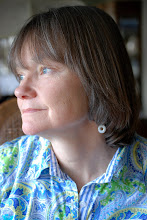Octavia Butler

I was at the small and intimate Potlatch writers conference in Seattle last week. It’s a nice gathering of readers and writers without the glitter and costuming of larger SF/fantasy conventions. It honored the Clarion West Writers Workshop’s twenty-fifth anniversary and it honored Octavia Butler who died unexpectedly. I was on the panel that discussed one of her later books, ‘Parable of the Sower’. I wanted to be there, at that panel. I stumbled over Octavia’s work in an issue of Asimov’s in 1984, and ‘Blood Child’ was like sticking my finger into a electrical outlet. I was zapped full of energy. Here was SF that I could make my own, dealing as it did with the themes of power and sexuality and dominance. I had been reading SF voraciously since the late sixties, but this, this was one of those rare stories that went beyond spaceships and the new frontiers of science to step outside and look inward at who we are as a species. Wow! In that galvanizing afternoon, I though ‘I want to write this’. Well, it took a few more years but there you go and here I am. Other writers were looking beyond the immediacy of science and our technological future but that story is one that really struck home for me. It was an invitation. I took it.
I think Octavia Butler is one of the unappreciated talents in literature. Well, she’s appreciated in the field of speculative fiction, but her focus was on larger themes, human universals that should have gotten her a larger attention. Through her stories like ‘Clay’s Arc’, her Pattern series, she looked at power and how we exercise it, through genetic dominance, sexual dominance, economic dominance. Because the focus was on power, she transcended the limitations of race, gender, and class.
In ‘Parable’ I saw a real change. In all her other books, change is forced on humanity by outside influences. Here, she portrays a character who creates change herself. She says ‘let us make things different’ and then goes about doing so. We don’t often deal with how to make things better in our genre. Mostly we deal with what happens when things go wrong. Our characters react to those changes, they rarely initiate them.
But in the end, it was also a disturbing read. Her dystopic future of gated neighborhoods that in the end cannot withstand the tide of those with nothing to lose and everything to gain, is a lot closer to my reality today than I like to see, even out here in our rural interface at the edge of the stalled suburbs. Grim reading with a seed of hope buried in it.
Maybe we need more books that deal with ‘how do we make it work’. Even if they are harder to write.
Labels: blood child, future, octavia butler


0 Comments:
Post a Comment
<< Home